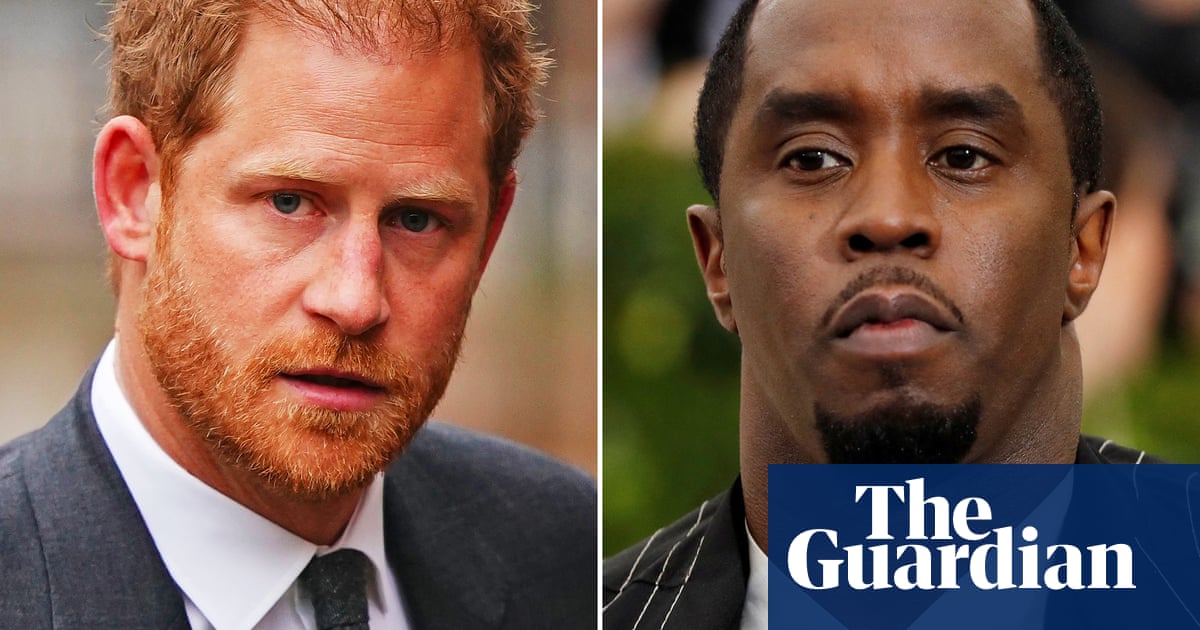Prince Harry accused the Sun newspaper of being motivated by revenge when publishing a front page story reporting that he had been named in a lawsuit accusing Sean “Diddy” Combs of sex trafficking, according to claims in a newly disclosed court document.
The story was said by the Duke of Sussex to be among “a large number of false and highly derogatory articles” published by Rupert Murdoch’s News GroupNewspapers(NGN) “in retaliation” for his claims of phone hacking and unlawful information gathering.
Harry claimed that the article and others published by the Sun and the Sun on Sunday had “a hugely negative impact on his mental health and that of his wife and children”.
NGN denies the claim about its journalists’ motivation, adding that the article was accurate and that “the Sun publishes stories about the Duke of Sussex which are justified because of the role he holds and the actions he has taken.”
Harry’s allegations are contained in a schedule to his skeleton argument in support of a claim for damages over alleged unlawful behaviour at NGN’s newspapers.
The case against NGN, which was jointly taken with the former deputy Labour leader Tom Watson, was not tested in court as it was settled in January with a payout to the claimants for legal costs and damages reportedly in excess of £10m.
If the case had not been settled, NGN was prepared to argue that the claim was outside the six-year statute of limitations and to challenge allegations relating to the sourcing of a series of articles highlighted by the duke, according to the company’s defence argument. The court had already ruled that his allegations specifically relating to phone hacking were too late.
The Guardian is able to report from the legal arguments after the parties agreed to their provision after an application to high court judge, Mr Justice Fancourt.
In the schedule setting out Harry’s claims, it was alleged that “since issuing his claim on 27 September 2019, NGN has published in the Sun or Sun on Sunday a large number of false and highly derogatory articles about the DoS plainly in retaliation, including articles that suggested he has somehow ‘betrayed’ his family, has ‘lied’ about them to garner sympathy, is a ‘traitor’ to his country and, perhaps most damaging of all, has been named in a high-profile sex-trafficking case.”
The claim went on to allege that the articles put such a “strain on his relationship with the royal family that he was forced to leave the institution and relocate to North America, leaving behind all that he knew and held dear”.
The mention of a “high-profile sex-trafficking case” is a reference to a front page story published in the Sun on 27 March 2024 reporting that Harry had been named in a £24m sex-trafficking lawsuit filed against US rapper P Diddy.
It ran under the headline “Harry named in P Diddy sex traffic case”. The story went on to claim that “bombshell legal filings allege Diddy used Harry’s name to give ‘legitimacy’ to wild parties where ‘serious illegal activity’ took place”.
It stated at the bottom of the fourth paragraph that Harry was not accused of any wrongdoing.
The story, which was also covered over two pages inside the newspaper, was reporting a legal claim made by the record producer Rodney Jones against Combs, who is on trial over criminal charges of sex-trafficking and racketeering. He denies the allegations.
Jones had alleged that “affiliation with, and or sponsorship of Mr Combs’ sex-trafficking parties” earned people “access to celebrities such as famous athletes, political figures, artists, musicians, and international dignitaries like British Royal, Prince Harry”.
Sign up toHeadlines UK
Get the day’s headlines and highlights emailed direct to you every morning
after newsletter promotion
Harry has met Combs only once, in 2007 at the end of a memorial concert for his late mother, Diana, Princess of Wales. He has never attended any of the musician’s parties.
As part of the settlement over Harry’s claim in relation to unlawful news gathering, NGN apologised to Harry for phone hacking at the now defunct News of the World, the sister title to the company’s daily tabloid, and “for the serious intrusion by the Sun between 1996 and 2011 into his private life, including incidents of unlawful activities carried out by private investigators working for the Sun.”
A spokesperson for NGN defended their decision to publish the Combs story, adding that other media outlets had similarly covered the legal claim in the US.
It further noted that Harry had stood down as working royal and left the UK for California four years before the front page article.
The NGN spokesperson said: “We always take the greatest care to ensure what we report is accurate and the Sun reflects public opinion and debate. The Duke of Sussex and his wife have been interviewed and he has published a book. These have been contentious and the subject of legitimate scrutiny and opinion.
“The reference to the Duke of Sussex in the Sean Coombs case was because his name appeared in court documents in a case of huge international interest.
“It was made quite clear that there was no allegation of wrongdoing in respect of the Duke of Sussex and the article explained why he had been cited. The same information was published in multiple other titles.”
